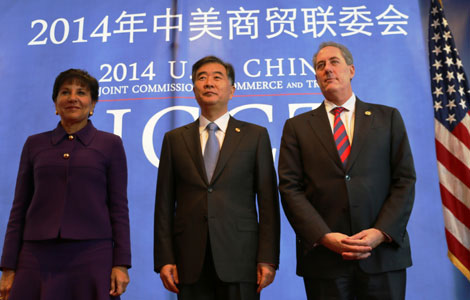Chinese tech giants gain ad-market share
Updated: 2014-12-18 13:39
By AMY HE in New York(China Daily USA)
|
||||||||
Four major Chinese tech companies are starting to overtake their American counterparts in the global digital advertising market, and are catching up to market giants Google and Facebook, according to researcher eMarketer.
In a new report, New York-based eMarketer estimated that Baidu, Alibaba, Tencent and Sina are all gaining market share, doing better in the digital advertising space than US companies that previously occupied the top ranks.
Baidu and Alibaba are estimated to have 4.68 and 4.66 percent shares of the global digital ad market in 2014, respectively, up from 3.74 and 3.98 percent last year, eMarketer said on Tuesday. The two companies trail Google and Facebook, which are both blocked in China, and outrank Microsoft and Yahoo. Tencent has 0.83 percent market share and Sina has 0.38 percent.
Google and Facebook remain the biggest players in the digital ad market, taking 31.1 and 7.75 percent, respectively. Google's share dipped from 31.55 percent last year, and Facebook increased from 5.75 percent, according to eMarketer.
"For Baidu, Google's being blocked in China definitely attributes to its dominant market share, in both the search market and the overall digital ad spending market," Wang Haixia, vice-president of forecasting at eMarketer, told China Daily.
"For global companies to conquer a local market like China, there are always political and cultural barriers. Google's market share before the censorship might've slipped even if they continued to operate there up to now simply because of Baidu operating in its home market, just as a company like Baidu would meet challenges expanding into the US to compete with Google," she said.
Jonathan Lee, managing director of brand strategy at New York-based digital agency Huge, said that companies looking to create digital advertising strategy in China simply cannot avoid giants like Baidu and Alibaba.
"If you want to know why their ad revenue is growing, it's because they're the only game in town. You have to be there to reach the people and they're the place to be to reach the people. You can't avoid them, so you have to make them work in your favor," he said.
Juuso Myllyrinne, global strategy director for New York-based TBWA\Digital Arts Network, said that the speed at which Baidu and Alibaba are ascending in the market is surprising, but that it's not a huge surprise that the companies are up and coming.
Alibaba and Baidu are also gaining in the mobile Internet ad market, with 6.2 percent and 5.1 percent, respectively.
"Both Alibaba and Baidu have taken advantage of a rapidly expanding mobile ecosystem in China, where mobile internet ad spending is expected to increase 600 percent to $6.4 billion in 2014," according to the eMarketer report.
Myllyrinne said that agencies need to consider that China is "truly mobile first." Facebook and Google have both struggled with the transition to mobile, he said, "whereas in China, the country has basically leapfrogged all of that because there's easily half a billion internet users in China, and the majority access it through their mobile phones and they've never even had a desktop experience."
A May report from PricewaterhouseCoopers said that smart phone usage in China has "truly integrated into everyday life with broad levels of engagement across every category." The financial institution forecast that mobile advertising in China will grow 27 percent, from $2 billion in 2014 to $4.1 billion in 2017, surpassing growth in every other category in online advertising.
amyhe@chinadailyusa.com
Most Viewed
Editor's Picks

|

|

|

|

|

|
Today's Top News
China-US economic talks conclude with fruitful outcomes
Avon pays fine of $135m to settle bribery allegations
New observation system to boost maritime power
Japan, US delay defense guideline revision
China urges US to correct itself after WTO case win
Venezuela could seek China's help as oil drops
China, Chile seek enhanced trade, investment
'Made in China' helps Brazilian consumers
US Weekly

|

|
















